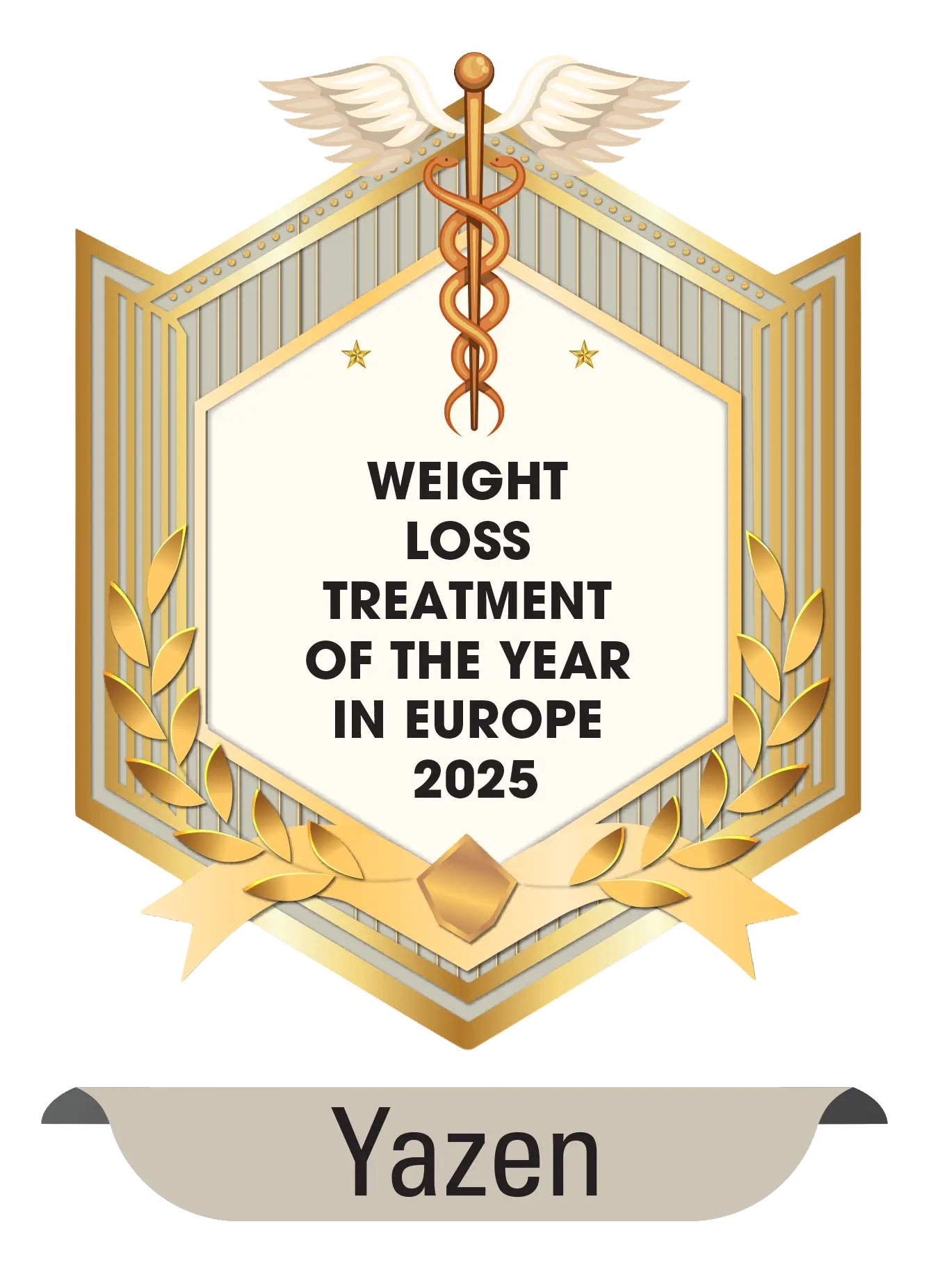Understanding Hypothyroidism: A Common Condition Among Women
Hypothyroidism is a common condition, especially among British women—and at Yazen, we’re here to help you understand and manage it with confidence.

Hypothyroidism, also known as an underactive thyroid, is a health issue that affects many people worldwide, especially women. In the UK, it’s estimated that one in ten women visits their doctor for thyroid-related problems, which can include both hypothyroidism and hyperthyroidism, with hypothyroidism being the most commonly diagnosed condition. Hypothyroidism occurs when the thyroid gland, located in the front of the neck, doesn’t produce enough hormones. This hormone shortage can lead to various physical and emotional symptoms. Several factors, including autoimmune diseases, nutritional deficiencies, and stress, can contribute to hypothyroidism. In this article, we’ll discuss what causes hypothyroidism, its symptoms, available treatments, and how Yazen, a health service provider, helps manage related weight challenges.
What is hypothyroidism (underactive thyroid)?
Hypothyroidism (underactive thyroid) is a condition where the thyroid gland doesn’t produce enough hormones, specifically thyroxine (T4) and triiodothyronine (T3). These hormones regulate several bodily functions, including metabolism, which is why a lack of them can lead to symptoms like fatigue, weight gain and depression. This condition can affect anyone, but it’s 5-10 times more common in women than men, especially during certain life stages like menopause or after childbirth. About 3% of the UK population, predominantly women, are treated for hypothyroidism, including cases of mild thyroid failure, also known as subclinical hypothyroidism.
Causes of hypothyroidism and thyroid hormone levels
Understanding the causes of hypothyroidism is key to managing the condition:
- Autoimmune diseases: Hashimoto’s thyroiditis, also called “autoimmune thyroiditis”, often leads to hypothyroidism. In this condition, the immune system attacks the thyroid gland, reducing its hormone production. Blood tests for thyroid antibodies are crucial in confirming if the condition is autoimmune in nature, particularly in cases like Hashimoto's disease. Thyroid disorders, including autoimmune conditions like Hashimoto’s disease, can significantly impact thyroid function and lead to hypothyroidism.1,5
- Nutritional deficiencies: Iodine is crucial for thyroid hormone production. In non-iodine-sufficient areas of the world iodine deficiency and other nutritional deficiencies, like selenium, is the leading cause of hypothyroidism.1,5-7
- Stress: Evidence suggests that prolonged chronic stress can disrupt hormone production and affect the immune system, potentially triggering thyroid issues.1
- Life stages in women: Hormonal changes during pregnancy, postpartum, and menopause, can lead to hormonal changes that may increase the risk of developing hypothyroidism. It is essential to monitor thyroid hormone levels for the diagnosis and management of thyroid disorders.1
Risk Factors for Hypothyroidism
Hypothyroidism can affect anyone, but certain individuals are at a higher risk of developing the condition. Understanding these risk factors can help in early detection and management:
- Family history: If you have a family history of thyroid disease, you are more likely to develop hypothyroidism. Genetic predisposition plays a significant role in thyroid gland disorders.1,7
- Autoimmune disorders: Conditions like Hashimoto’s thyroiditis, where the immune system attacks the thyroid gland, can significantly increase the risk of hypothyroidism.1,5-7
- Thyroid surgery: Surgical removal of part or all of the thyroid gland (thyroidectomy), to remove goiters, thyroid nodules, to treat thyroid cancer or in severe hyperthyroidism, can lead to an underactive thyroid.1
- Radiation therapy: Exposure to radiation, especially in the neck area, can damage the thyroid gland and lead to hypothyroidism.1
- Iodine deficiency: Iodine is crucial for thyroid hormone production. A deficiency in this essential nutrient can result in an underactive thyroid gland.1,5-7
- Pituitary gland problems: The pituitary gland secretes thyroid stimulating hormone (TSH), which stimulates the thyroid gland to secrete hormones that affect body metabolism. Issues with this gland can disrupt the balance of thyroid hormones, leading to hypothyroidism.7
- Age: Thyroid diseases are common at all ages but are somewhat more common in the elderly and women. Women after childbirth are also at high risk of developing (sometimes temporary) hypothyroidism, known as postpartum thyroiditis.1,7
By being aware of these risk factors, individuals can take proactive steps to monitor their thyroid health and seek medical advice if necessary. At Yazen, you have quick access to your medically responsible doctor. If you suspect you have a thyroid disorder, consult with a doctor or specialist, and consider contacting organizations such as the British Thyroid Foundation for additional support and information.
Symptoms of hypothyroidism
Hypothyroidism symptoms can vary from mild to severe and recognizing them is crucial for diagnosis and effective treatment.
Common symptoms of hypothyroidism include:1
- Fatigue: Persistent tiredness despite adequate sleep
- Weight gain: Unexplained weight gain due to a slower metabolism
- Depression or mood changes: Feelings of depression or irritability
- Cold sensitivity: Feeling cold even when others are comfortable
- Dry skin and hair: Dryness and thinning of skin and hair
- Menstrual Irregularities: Heavier or irregular periods
- Hoarseness: Swelling of the vocal folds, known as Reinke's edema, can lead to vocal fold dysfunction, resulting in a hoarse voice.8
If you suspect you have thyroid issues, consult a healthcare provider for proper diagnosis and treatment.
Diagnosis of Hypothyroidism
Diagnosing hypothyroidism typically involves a combination of physical examination, medical history and laboratory tests. Early diagnosis is crucial for effective management, preventing complications and for quality of life. Common diagnostic methods include:1
- Thyroid-stimulating hormone (TSH) test: This is often the first test conducted. It measures the level of TSH in the blood. Elevated TSH levels can indicate an underactive thyroid, as the pituitary gland produces more TSH to stimulate the thyroid gland to produce enough thyroid hormone.
- Thyroid hormone tests: Assess levels of free thyroxine (FT4) and free triiodothyronine (FT3). Low levels confirm hypothyroidism.
- Thyroid antibody tests: Detect antibodies that suggest autoimmune disorders like Hashimoto’s thyroiditis.
- Thyroid ultrasound: Creates images of the thyroid to identify nodules or abnormalities.
- Physical examination: Can reveal signs of hypothyroidism, such as dry skin, hair loss, and cold intolerance.
Early diagnosis and treatment of hypothyroidism can significantly improve quality of life and prevent complications. If you suspect you have thyroid issues, consult a healthcare provider for proper diagnosis and treatment. Thyroid hormone medicine is often used to treat hypothyroidism, particularly during pregnancy, and proper dosage and monitoring by healthcare providers are crucial for the safety and effectiveness of the treatment.
Treatment and Management of Hypothyroidism
Hypothyroidism and weight gain
Weight gain is a common and challenging symptom of hypothyroidism. Underactive thyroid disease, also known as hypothyroidism, is characterized by insufficient hormone production from the thyroid gland, leading to various metabolic issues. Thyroid hormones regulate metabolism, and lower hormone levels mean the body burns fewer calories, leading to weight gain. This gain is often due to water retention and a slower metabolism, not just fat accumulation.9-11
Yazen offers medical support for weight management, especially for individuals dealing with weight gain related to hypothyroidism. The Yazen-approach includes assessing thyroid status by initial blood tests for thyroid hormones (TSH and free T4), before combining medical treatment with lifestyle modifications to help individuals regain control over their weight and overall health.
A multi-faceted strategy for managing hypothyroidism and weight
At Yazen we recognize the importance of addressing any underlying thyroid issues that may contribute to weight challenges. Yazen’s program addresses both medical and lifestyle factors related to weight management in individuals with hypothyroidism by offering:
- Medical Treatment: If initial blood tests reveal abnormalities in thyroid hormone levels, we refer to collaborative specialised healthcare providers for further evaluation and potential treatment, including hormone replacement therapy. Addressing thyroid health is crucial, as it can help regulate metabolism and alleviate symptoms associated with weight gain. By working collaboratively with thyroid specialists, we can create a comprehensive approach that includes lifestyle modifications aimed at improving overall health and well-being for our patients.
- Nutritional guidance: A balanced diet rich in whole foods, including vegetables, lean proteins, and healthy fats, can support thyroid function.15
- Exercise plans: Regular physical activity is vital for maintaining a healthy metabolism. Yazen offers personalised exercise plans that take into account the fatigue and joint discomfort often experienced by those with hypothyroidism, promoting gentle and sustainable activity.13,15
- Stress management: Since stress is a known trigger for thyroid issues, the Yazen-treatment includes techniques for reducing stress, such as mindfulness, yoga, relaxation exercises, as well as sleep quality advice. These approaches aim to improve overall health and well-being.14,15
Balancing Hypothyroidism and Weight Loss
Hypothyroidism is a common condition, particularly among women. At Yazen, we recognize that hypothyroidism can contribute to challenges in weight management, which underscores the importance of our comprehensive approach to obesity treatment. While it is essential to address hypothyroidism, our approach emphasizes the importance of holistic care that integrates medical support with lifestyle modifications tailored specifically for weight loss. By recognizing the interplay between hypothyroidism and weight gain, we empower individuals to overcome the barriers to achieving their health goals. Our comprehensive solutions not only address thyroid health but also foster overall well-being, ensuring individuals can lead healthier and more balanced lives.
If you are struggling with weight issues and suspect thyroid involvement, we invite you to explore how Yazen can support your journey to better health.
References
- Hughes et al. 2017. Hashimoto’s thyroiditis How to spot the diagnosis and how to manage it. MedicineToday; 18(9): 27-32. https://www.researchgate.net/publication/320135645_Hashimoto's_thyroiditis_How_to_spot_the_diagnosis_and_how_to_manage_it#fullTextFileContent
- NHS_Overview-Underactive thyroid (hypothyroidism): https://www.nhs.uk/conditions/underactive-thyroid-hypothyroidism/
- NICE -Thyroid disease: assessment and management: https://www.nice.org.uk/guidance/ng145
- Ahluwalia et al. 2023. Use of liothyronine (T3) in hypothyroidism: Joint British Thyroid Association/Society for endocrinology consensus statement. Clinical Endocrinology. 99:206–216. https://doi.org/10.1111/cen.14935
- Biondi et al. 2019. Subclinical hypothyroidism: A review. JAMA. 322(2):153–60. https://doi:10.1001/jama.2019.9052
- Huges et al. 2021. Thyroid disease: Long-term management of hyperthyroidism and hypothyroidism. AJGP. 50:1–2. https://doi: 10.31128/AJGP-09-20-5653
- Zúñiga et al. 2024. Hypothyroidism and Cardiovascular Disease: A Review. Cureus. 16(1). https://doi.org/10.7759/cureus.52512
- Batra et al. 2022. Chronic Uncontrolled Hypothyroidism Associated With Dysphonia and Concurrent Pericardial Effusion. Cureus 14(5): e25261. https://doi.org/10.7759/cureus.25261
- Brown et al 2023. The Thyroid Hormone Axis and Female Reproduction. Int. J. Mol. Sci. 24:9815. https://doi.org/10.7759/cureus.25261
- Meligi et al. 2024.Exploring obesity‑related endocrine disorders beyond diabetes: a narrative review. The Egyptian Journal of Internal Medicine. 36:90. https://doi.org/10.1186/s43162-024-00358-w
- Wang et al. 2023. The management and metabolic characterization: hyperthyroidism and hypothyroidism. Neuropeptides. 97:102308. https://doi.org/10.1016/j.npep.2022.102308
- Werneck et al 2018. Exercise training improves quality of life in women with subclinical hypothyroidism:a randomized clinical trial. Arch Endocrinol Metab. 62 (5). https://doi.org/10.20945/2359-3997000000073
- Bhandari et al. 2024. Effect of Yoga Therapy on Hypothyroidism: A Systematic Review. Annals of Neurosciences. 1–12. https://doi.org/10.1177/09727531241282516
- Lankhaar et al. 2021. Physical activity, sports participation and exercise-related constraints in adult women with primary hypothyroidism treated with thyroid hormone replacement Therapy. Journal of Sports Sciences. 39:21, 2493–2502. https://doi.org/10.1080/02640414.2021.1940696
- Janota et al. 2023. Lifestyle and Quality of Life of Women with Diagnosed Hypothyroidism in the Context of Metabolic Disorders. Metabolites. 13: 1033. https://doi.org/10.3390/metabo13101033

July 1, 2025
November 28, 2025
Start your weight loss journey with Yazen today
Everything you need to do is to create an account and answer some questions about your health
.svg)
.svg)
More articles
Trulicity (dulaglutide) in the treatment of obesity
Trulicity is a medicine that contains the active substance dulaglutide. It is approved for the treatment of adults with type 2 diabetes to improve glycaemic control as a complement to a healthy diet and physical activity (1). The treatment may also contribute to weight loss (2–4).




.svg)

















